Photographs: Courtesy: The Samajwadi Party Shivam Vij
'Hawa is the public discourse that transforms electoral issues and caste calculus into the hard numbers on the EVM machine,' says Shivam Vij.
Public transmitter' nahi ban sakey Mulayam aur Mayawati (Mulayam and Mayawati could not become public transmitters).
In the Hindi version of that line, the phrase public transmitter is in single quotes only because they are English words in a Hindi paper. The entire sentence is not in quotes. A sentence like this, if it were the title of a text, would count as an expression of opinion. And yet, it was a news headline in the Varanasi edition of Uttar Pradesh's largest selling daily, Dainik Jagran.
In case you could not guess who it was trying to help, there was the photo of Rahul Gandhi below the headline. This was the lead story.
Whether or not this was an instance of 'paid news' is less important than the fact that it is clearly trying to influence the voter.
As I sat with an Urdu journalist in a constituency where Muslim votes were considered the largest voting block, he kept getting calls from a candidate's representative to publish 'paid news' that said his party was going to be Number One.
The reporter kept saying 'paid news' was no longer possible, but he would keep getting calls from different friends of friends to persuade him.
Please ...
For the latest on the UP election, please check Rediff Realtime News
What you must know about the election 'hawa'
Image: Rahul Gandhi: No longer standing tall in Uttar PradeshPhotographs: Jitendra Prakash/Reuters
It needs to be asked: When candidates can pay, why not spend the money on advertisements? What is it that they want communicated to the voter that demands the legitimacy of a news report? The single idea they want communicated the most is the prediction that they are likely to win, or are at least in the race, or 'strong.'
A constituency could have as many as dozen candidates and many voters will never hear some of the names. Whoever gets the most votes will win. Most voters want to know: Who in this constituency is in the race?
If the Muslim block of 70,000 voters is voting for X, and the Dalit block of 50,000 voters is voting for Y, and the Kurmi block of 35,000 voters is divided between X and Y, it clearly means X and Y are in the race.
So even though a voter's natural choice is Z, he knows it is either X or Y who is likely to win. Even Z knows he has no chance because he has no caste or religious block to back him.
There are quite a few voters who'd like to vote for Z, but since Z is clearly 'not in the race,' such voters would choose between X and Y.
So the most important task before Z is to give voters at large the impression that he is very much in the race. This is why he needs the credibility of a news report.
If a news report could say that Muslim votes are also divided and many are shifting towards Z, perhaps voters at large would think Z is in the race and take him seriously.
What the news report is trying to do, then, is create a hawa. It's in the air that Z is a strong contender, haven't you heard? But paid news is only one of the means through which the hawa is created.
Please ...
For the latest on the UP election, please check Rediff Realtime News
What you must know about the election 'hawa'
Image: UP voters have shown massive anger against Mayawati's BSPPhotographs: Amit Dave/Reuters
When I travelled in Uttar Pradesh in January there was absolutely no hawa. Journalists and politicians in Lucknow, like the party workers in Bundelkhand's villages, said that the election isn't yet in the air. It will take time. Parties haven't declared all their candidates. Mayawati hasn't started campaigning. Come after 26 January, they said.
When I travelled in February, the hawa was all over. Don't you know there is massive anger against the BSP? People are getting together to boot her out. She's ruined our lives with fake SC/ST (Prevention of Atrocities) Act and all her development benefits have gone to the Jatavs! What did we get?
In no time, the hawa had been created. Incredible, but not so incredible. This is the land where in the year 1857, the mutiny was organised from Jhansi to Delhi purely by word of mouth.
The Delhi media, especially television, seemed to give more space and prominence to the Congress -- a special show on Priyanka Gandhi lasted an hour-and-a-half for no rhyme or reason. Not that the English media has much of an impact on the hawa, but it puts in its best for its favourites.
Rahul Gandhi said in rallies that he was a long-distance runner, which suggested he wasn't 'in the race' this election. But the Congressmen in Lucknow and Delhi had successfully created the hawa that the Congress was going to sweep Western UP and win 100 seats.
Towards the end of the election, as ground realities overtook the hawa, these pundits disappeared.
Please ...
For the latest on the UP election, please check Rediff Realtime News
What you must know about the election 'hawa'
Image: Supporters of the Congress party at an election rally addressed by Rahul GandhiPhotographs: Pawan Kumar/Reuters
Besides these meta-narratives of the hawa, there was also the hawa that you wouldn't catch from the media.
If you were to ask the BSP's workers, they would tell you that the BBC has predicted 217 seats for Mayawati. Of course, the BBC doesn't predict seats and few will take you seriously in February 2012 if you predicted a majority for the BSP.
And yet creating such a hawa, using the credibility of the BBC as against the lack of credibility of the Lucknow and Delhi media, was important because voters had to be given the impression that the BSP isn't down and out the way people were saying.
In the 2009 Lok Sabha elections, everyone was surprised that the Congress did so well. Congressmen and women themselves were surprised, because there was no party cadre to mobilise voters. And yet the Congress did well, because the hawa was spun about its return. This included biased media coverage there were stories in Lucknow's Hindi papers that clearly looked like paid news.
This hawa had a credible narrative -- which is that the caste parties had reached their zenith with the BSP gaining majority in 2007, and the the Congress was returning to UP with the efforts of a Superman named Rahul Gandhi.
Of course, it wasn't the hawa alone: Voters were responding to the performance of the UPA's government at the Centre, to the idea that Mayawati should be prime minister, and so on.
And yet the hawa was crucial because the Congress had been declared 'finished' in UP, but for the sole islands of Amethi and Rae Bareily.
Please ...
For the latest on the UP election, please check Rediff Realtime News
What you must know about the election 'hawa'
Image: A supporter of Mayawati during an election rallyPhotographs: Pawan Kumar/Reuters
This is not to say that a hawa is some kind of lone, determining factor devoid of real issues on the ground. That would make it like the opaque term 'anti-incumbency' with which psephologists have over-simplified our understanding of elections.
But hawa is the public discourse that transforms electoral issues and caste calculus into the hard numbers on the EVM machine.
The hawa plays a critical role in influencing the fluctuating voter, the fence sitter, who is often the small caste group not mobilised by any political party, or the small but significant number of voters within caste blocks who doesn't vote with the community.
Such votes are incalculable in the caste matrix with which candidates target voters. And yet such votes can decide the winner in closely contested elections such as the one in UP, where many win with very small margins.
The fence-sitting voter needs to be influenced by the hawa for a leading candidate to tilt the scales. This is what explains the BSP's 206 seats in 2007 when even BSP leaders expected at most 180, or the Congress' 22 seats from UP in the Lok Sabha in 2009 when Congress leaders privately said they expected 15.
No one can control which way the wind blows.
Please ...
For the latest on the UP election, please check Rediff Realtime News
What you must know about the election 'hawa'
Image: Akhilesh YadavPhotographs: Courtesy: The Samajwadi Party
Not every hawa is proved right -- like in 2004, when it was predicted that the BJP-led NDA combine would return to power; to its own surprise, the Congress did. The exception only proves the rule.
The business of hawa management and its interception should not be taken lightly. It needs a close look and academic study.
Catching the hawa is what travelling journalists do: They go to a village or two, stop at chai (tea) and paan shops, read the local papers. And they often get a picture more accurate than the survey numbers of opinion and exit polls.
When pollsters get data that is contrary to the prevailing data, they hesitate and press into force the error margins.
The hawa isn't entirely in the control of candidates and their parties. What is this 'hawa' then? It is nothing but the Habermasian public sphere: In this public sphere, some have a voice greater than others.
The voices of Brahmins are the loudest, not least because the UP media is heavily Brahmin dominated. By contrast you will often hear that the BSP voter -- which refers to the Dalit voter -- is a 'silent voter.' Why is s/he silent? Doesn't s/he have a tongue?
Go to a village and talk in an inter-caste group. You will see how upper castes just don't let Dalits speak. Ask a Dalit a question and the Brahmin standing next to him will answer. And so it is that the discourse of the chai shop, the chauraha, the village square, is dominated by upper castes.
Please ...
For the latest on the UP election, please check Rediff Realtime News
What you must know about the election 'hawa'
Image: Voters queue up outside a polling centre to cast their vote in Haraiya, Uttar PradeshPhotographs: Jitendra Prakash/Reuters
The hawa is crucially said to be affected the night before the vote, but not as much by alcohol or money as is presumed. Even the culture of community meetings the day before is on the decline.
But rumour-mongering continues in the age of mobile phones. Even during the polling, men on bikes go around motivating voters with such perceptions as, 'That community is voting in large numbers for that party! Their queues are unending, what are you doing?'
The BSP's 2007 victory is explained by its Dalit-Brahmin alliance. But actually the alliance was with all castes, and it wasn't as if the BSP was giving tickets to upper castes for the first time.
According to the exit polls, only 17 per cent of the Brahmins voted for the BSP during that election anyway. And yet, a media-shy BSP made a great show of its Brahmin sammelans (meetings) in 2007 because it sent out a message to everyone -- that if even Brahmins could join a party led by Dalits, everyone would. Everyone did.
In Lucknow, I saw to my shock people who had always voted for BJP or SP, vote for the BSP.
I wrote before the elections became a full-fledged tamasha about the futility of predicting elections. Why is the media obsessed with predictions? How does it matter even if you got it right?
But having closely observed the extreme speculative nature of the election coverage -- trying to predict phase by phase who is doing well where -- I am increasingly convinced the obsession with predicting results is more than just pandering to the base instincts of media consumers who are curious about the result.
It serves a larger purpose, that of not just reading the hawa, but also creating it.
Please ...
For the latest on the UP election, please check Rediff Realtime News
What you must know about the election 'hawa'
Image: Akhilesh YadavPhotographs: Courtesy: The Samajwadi Party
While the regional media has been rightly called out on paid news, the Delhi media and its biases, its extra airtime for some parties and star leaders, is a problem because that actually helps create the hawa.
The media is all too aware of its role in influencing the voter. Which is why, when the Election Commission some years ago banned the telecast of exit polls between election phases, the sultans of Indian news television did not cry blue murder.
No one said the EC was murdering the media's freedom of speech. That is because they are all too aware of the power of election predictions influencing voters. But it's just that they don't telecast or publish numbers; they still give us large doses of speculation dressed up as analysis in the name of election reporting.
In a report from inside the satta (betting) market, Vrinda Gopinath writes about the role of bookies who pump in money for candidates and parties which is as much based on the hawa as it seeks to influence the hawa. But even the bookies get predictions wrong.
Tellingly, she quotes a bookie: 'Media plays a bigger role than money power. Politicians want to own and control media, from Jayalalitha to Karunanidhi to Sharad Pawar, as it plays the single most influential role in creating the 'hawa' -- which is why politicians and business tycoons want to own media houses. It moves money, in betting syndicates or stock markets. Media is the thoroughbred in this race.'
It's an absurdity of the first-past-the-post electoral system that perceptions need to be created so that they could turn into reality.
Say Z is gaining ground and Z may well gain ground. Z may not win, but he may take away enough of Y's core votes to ensure the victory of X.
From the studios of Delhi to the chai shop in Mughal Sarai, we need to study who creates the election hawa, how is it created, how does it travel, which hawa gains ground and which doesn't?
That may tell us more about Indian elections than redundant surveys that are but one part of the hawa-making process.
For the latest on the UP election, please check Rediff Realtime News

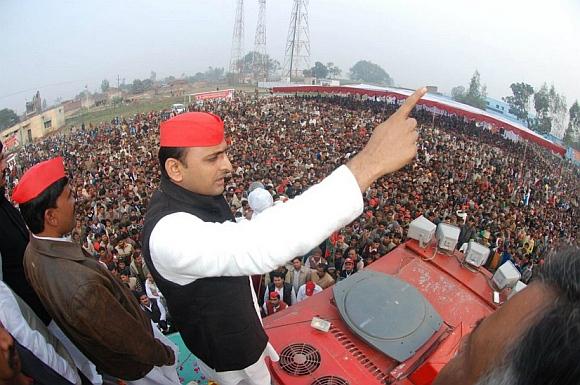


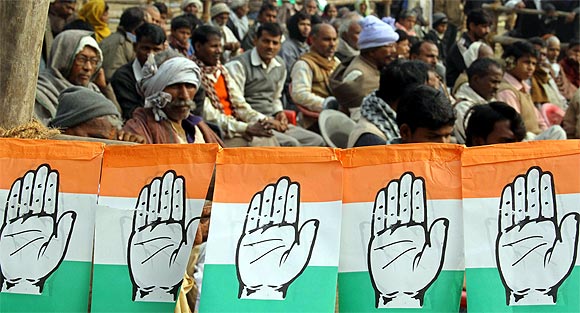
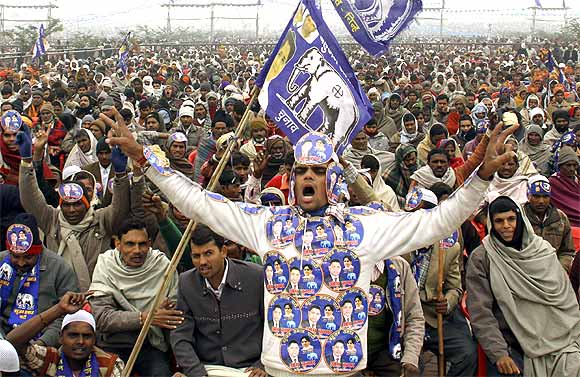
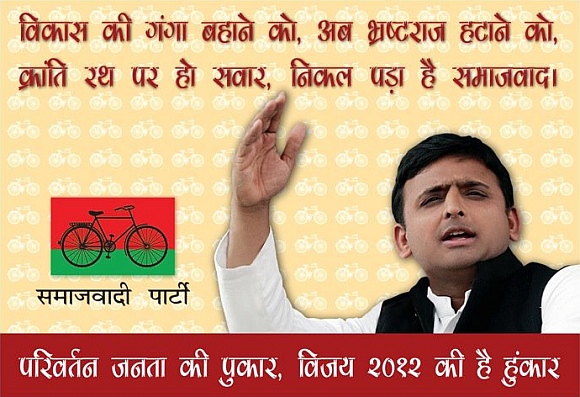
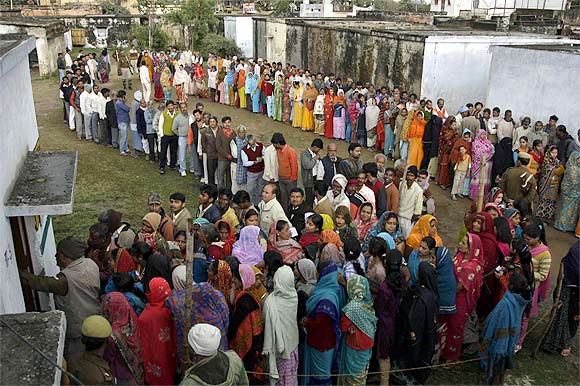
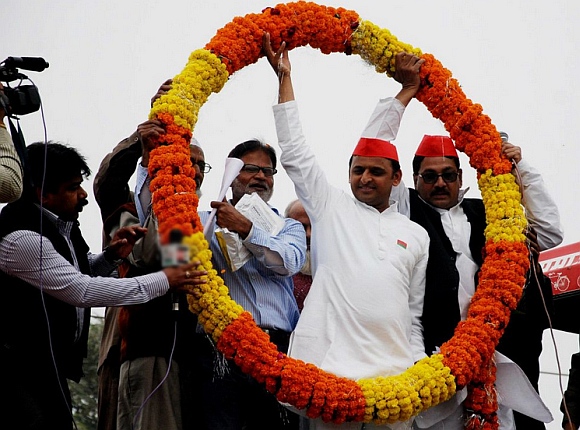
article